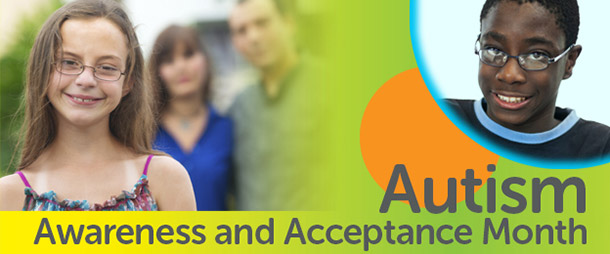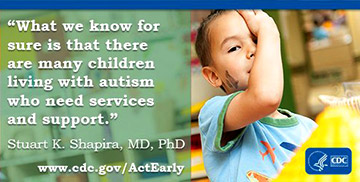Moving beyond awareness to promoting acceptance and appreciation, and raising expectations
New CDC Autism Data Highlights Importance of Long-term Services and Supports, Cultural Competency
Today the Centers for Disease Control and Prevention (CDC) released data from its Autism and Developmental Disabilities Monitoring Network indicating that 1 in 68 school-aged children are on the autism spectrum. In announcing the rate, which is unchanged from 2014, the CDC called attention to the critical role services and supports play in helping people with autism reach their full potential.
Autistic children, like people with all types of disabilities, need more avenues to gain independence. From an early age, they need to learn life skills that will enable them to fully participate in the community and to be actively and meaningfully involved in planning for their own transition to adulthood.
We need to have higher expectations for people with disabilities, in everything including academic achievement. We must empower them to do more than stay at home or work in non-integrated settings, like sheltered workshops. We also must take action to structure our communities and workplaces to embrace neurodiversity and benefit from these individuals’ strengths.
To achieve this, we must ensure services are available to support children with autism through all stages of life—from early childhood and the school years, as they look toward college and employment, and ultimately as they live independently as adults.
To that end, the nation’s 67 federally-funded University Centers for Developmental Disabilities (UCEDDs) are playing a leading role in conducting research, developing and testing cutting edge practices, and connecting families with services and supports.
For example, the University of Wisconsin-Madison’s Waisman Center demonstrates the effectiveness of starting early and establishing high expectations for all children. Its supportive learning environment for a developmentally diverse group of children between the ages of 1 and 5 offers a model of promising practices for other schools and organizations.
UCEDDs also have been key partners in the CDC’s Learn the Signs. Act Early. campaign,


which aims to improve early identification of children with autism and other developmental disabilities so children and families can get the services and support they need.
State Councils on Developmental Disabilities also are playing a role. Many participate in Project SEARCH, a program which uses real-life work experience to help youth with disabilities make successful transitions from school to adult life with jobs in integrated settings with good wages. State Protection and Advocacy systems often work with children with autism and their families on the development of—and adherence to—appropriate Individual Education Plans.
The CDC report also notes that black and Hispanic children are less likely to be identified as being on the autism spectrum, and they receive developmental evaluations at a later age than white children. This is a serious problem because a late or missed diagnosis can cause children and their families to miss out on services and supports that can help them thrive.
Although there is no single definitive explanation for the disparity in diagnoses, there are a number of factors that research suggests might play a role.
-
Black and Latino children on the autism spectrum are more likely to receive incorrect diagnoses such as ADHD or conduct disorders. Signs that black and Latino children may be on the autism spectrum are often dismissed and attributed to other social or cultural factors or other disabilities.
-
Black and Latino families may not have the same level of access to health care services, particularly specialized services.
-
Linguistic barriers can impact families for whom English is not a first language. For example, a study in California found that only 10% of surveyed primary care pediatricians could provide Spanish-language Autism screenings.
-
Particularly in black communities, a lack of trust in the medical profession because of historic abuses like the Tuskegee experiments, may cause parents to avoid seeking a diagnosis or treatment.
-
Greater stigma associated with developmental disabilities in black and Hispanic communities also may play a role in preventing parents from seeking assessments for their children.
And there may be other factors at play. Consequently, there is no single answer to the problem. However, there are efforts underway to help. For example, Birth to 5: Watch Me Thrive!, a coordinated federal effort to encourage universal developmental and behavioral screening for children, includes a number of Spanish-language screening tools.
Additionally, 43 Leadership Education in Neurodevelopmental and Related Disabilities (LEND) programs operate across the country, often working alongside a UCEDD. These programs, funded by the Health Resources and Services Administration, train professionals from diverse disciplines to diagnose autism and other developmental disabilities and use evidence-based interventions. Many of these programs have focused specifically on outreach to underserved communities.
Multiple projects at the University of Illinois at Chicago (UIC) also are focusing on outreach, working with the Hispanic community. The UIC UCEDD runs a clinic offering comprehensive interdisciplinary assessments in Spanish and/or English for individuals of all ages who believe they may have a developmental disability. One of the program’s specialties is autism. In addition, through a grant from the National Institute on Disability, Independent Living, and Rehabilitation Research at ACL, UIC is evaluating a training program for Latino parents of children with autism delivered by health educators, or promotoras, who themselves are parents of children with autism.
Such programs are necessary because research suggests that racial disparities impact families’ experiences long after a diagnosis is made. For example, a national study (PDF) found that black and Latino parents of children with developmental disabilities such as autism "were significantly less likely than white parents to report that their health care provider spent enough time with their child, or was sensitive to the family’s values and customs." For families for whom English is not a first language, language barriers can result in inaccessible services and make it even harder to navigate a system of services and supports that can be overwhelming for any family.
Given the many challenges, it is critical that cultural and linguistic competency be a part of every program and system that supports people on the autism spectrum and their families.
Recent efforts to address this challenge include the Diversity and Inclusion Toolkit developed by the Association of University Centers on Disability with guidance and funding from AIDD, to highlight specific strategies and resources that UCEDDs, national organizations and federal agencies can use to promote diversity and inclusion. In addition, with National Training Initiative grants from ACL/AIDD, 14 UCEDDs are developing diversity fellowship programs to support recruitment and retention of diverse trainees and build cultural and linguistic competence within their centers.
Tomorrow marks the start of Autism Awareness Month. This year—and going forward even after the month ends—let’s focus on more than awareness. Let’s work toward true acceptance. Let’s raise expectations, both for people with autism and for the world we live in.
We all benefit when everyone has the opportunity to contribute and participate—let’s commit to working even harder to ensure that opportunity fully includes people with autism.

